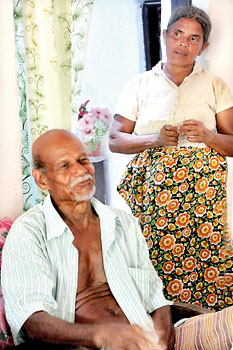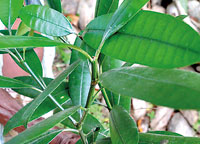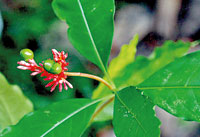He is a simple old man from a remote village, claiming to have cured/saved more than 3,000 snakebite victims, free of charge. It is not because he is rich, but considers it unethical to charge a fee from a person who is already in distress.
E.M. Banda, 84, is a native snakebite doctor, residing in a simple house, “Veda Nivasa”, in Wagolla, Palle-Inguruwatte, Inguruwatte, Mawathagama, among hills accessible via a difficult narrow road, a few kilometres away from Watareka junction, on the Mawathagama-Rambukkana road.
 |
| Banda with his daughter-in-law |
He lives with his daughter-in-law, who is looking after him and helped us by repeating our questions loudly as he is hard of hearing. His wife, and son had passed away leaving him with his daughter-in-law and grand children.
He was born in 1929, and studied at Watareka School, a few kilometres from his home. His mother died when he was 16. He could still remember how the children, biting a piece of stick, crawled into trenches, to hide from the Japanese bombers.His father, E.M. Dingiri Banda was a famous native snakebite doctor. There were four children, two girls and two boys. Banda was the only child who followed in his father’s footsteps, to become a native doctor. “Father always said that I could not be a good doctor, he always expected more from me,” he said. His father died in 1967.
Banda claims to have effective snake-charms against cobras and mapilas. For cobras, he would sprinkle sand, on which a charm has been recited, around the compound of the house, which will make it out of bounds for reptiles. For mapilas, it is a written charm that hung on the wall. According to him, deadly venomous snakes are a number of mapila species, cobras, vipers, and kraits. “When there’s protection, even a mongoose could not come into the compound,” he said.
“None whom I have treated to date, have died,” he declared. He could not say how many patients he had treated, but believes it could be more than 3,000, since he began practising,” he added. He said it is difficult to treat a person who was unconscious. “First I use nasnaya, a mixture of herbs to treat those who are unconscious, and once the person regains consciousness, he could be treated. I have never sent anybody to government hospitals for treatment,”he said.
Commenting on not charging a fees he said, “How can I charge a fee from someone who is in distress? But of course, most of them visit me with gifts, after they are cured.” He cultivates paddy and has a banana cultivation, although the market is very poor, he says. His elder brother lives in Kurunegala, looking after his rubber trees and gets an income. “I always work. I am used to working a lot,” he said.
“A snakebite victim fears for his life. Calm the victim and make him/her lie down, assuring of a doctor’s attention soon. Then apply some lemon on the bite, and apply a tourniquet above the bite, with a hair,” says Dingiri Banda when discussing first aid steps.
He said a strip of bark from the thel endaru (castor oil) tree could be used to tie up the place just above the bite. Medical assistance should be sought immediately. He does not recommend washing with water. His advice is to avoid places frequented by snakes such as termite hills, undergrowths and to light one’s way at night.
He said there is a proven first aid to spider as well as snakebites. “Take divi kaduru (Eve’s apple) leaves, peel the bark of the tree and some raw turmeric and common salt. Pound them in a mortar and heat the mixture in a pan. Apply the mixture on the bite. This could relieve the pain,” he said.
For paththaya or centipede bite, ekaweriya (rauwolfiaroot) leaves with lemon juice, and for wasp attacks karanda roots should be ground with lemon juice.
For spider-bites, he recommends thinly sliced divipahuru leaves mixed with raw, ground turmeric and salt mixture to be mildly heated and applied on the bite.
 |
| Divi kaduru (above) and ekaweriya (below):Some of the medicinal plants used by him.
Pix by Mangala Weerasekera |
 |
He noted that Saturdays and Sundays are regarded as days on which snakebites are difficult to cure.
“It is a pity that most young people today do not know what the trees and plants around them are,” he lamented. He said that certain plants are difficult to find. “Twenty- thirty years ago, there were fewer houses and trees and plants were everywhere,” he added. He has some of the medicinal plants in his home garden.
“Earlier, people knew most of the medicinal plants, because they took native treatment. They were not used to western medicines, as they have to go a long way to a Government hospital,” he observed.
Answering the question whether snakes shouldbe spared, he said, “They should not be killed, they are part of our world. Generally, snakes do not bite, unless somebody steps on them accidentally, or handles them. But there are occasions when they could be angry because they are disturbed while mating or if you happen to cross their paths, when they are after some prey,” he said.
He said there are less snakes in their home gardens now, as there are more houses and open spaces. But there are more snakes during the rainy season, and also during the paddy harvesting season in paddy fields and also in rubber estates.
Commenting on who will succeed him in the line of curing snakebite victims, he said he has three daughters of whom one lives in Polpithigama in the Kurunegala district, who does some practice. The other two are afraid to take on the responsibility he says. “My daughter-in-law however is competent and confident. She can treat and also knows some charms,” he revealed.
He said that many have expressed the wish to share his knowledge, but he has already decided who should carryon his work. “It should be my daughter-in-law, otherwise there would be a conflict of interest,” he said.
When it comes to his own wellbeing he said he did not usually take medication for any ailment. Once in away he takes a paracetamol. But mostly, he uses herbs and herbal medicine. He would boil a mixture of garlic, uluhaal (fenugreek seeds) and pepper together in a pot of water and drink it for any stomach ache.
|




